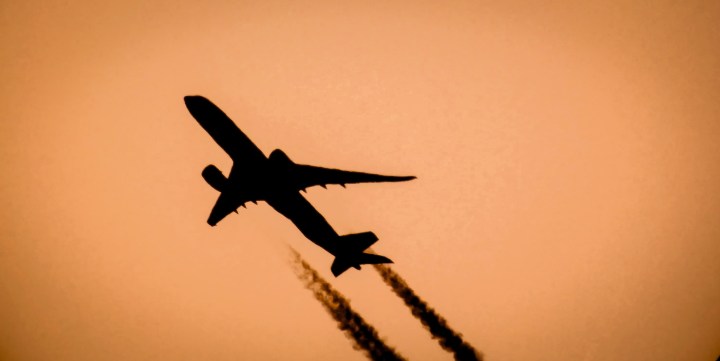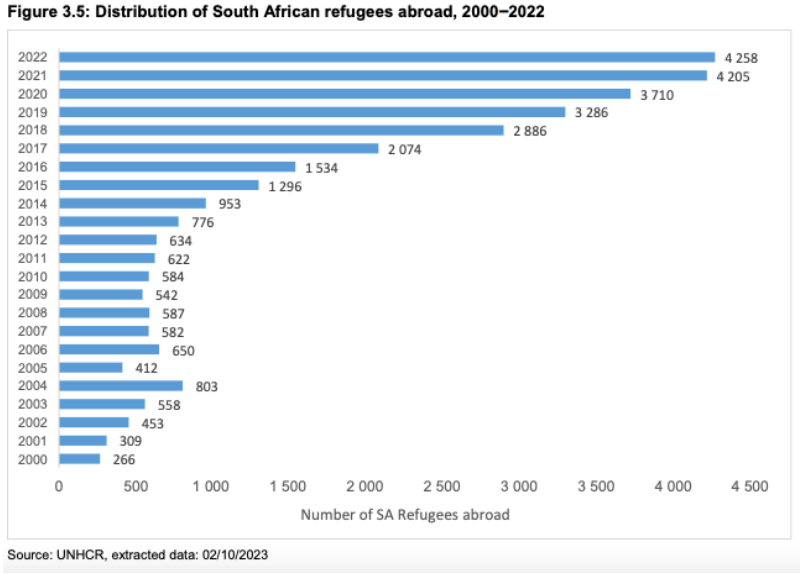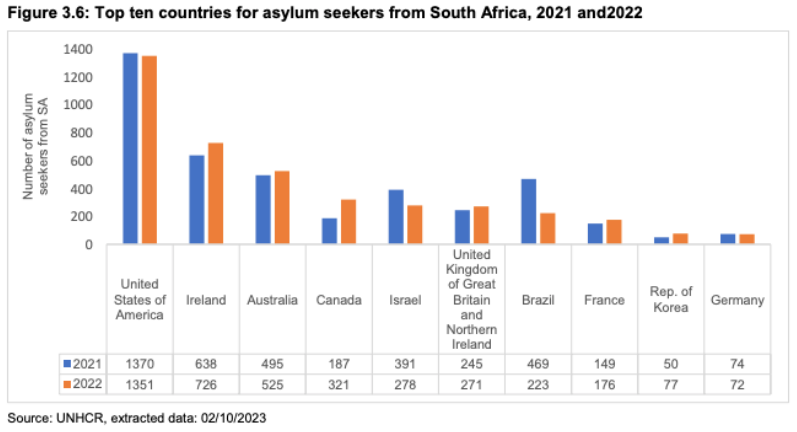FOREIGN REFUGE
Thousands of South Africans have sought asylum abroad, says Stats SA migration report

The country’s first report on migration shows while fewer people are making applications for refugee status, more South Africans are seeking protection in the US, Ireland and Canada.
South Africa’s massive asylum problem might have lessened in recent years, but more of our own are claiming asylum abroad than before. While the number of people seeking protection outside South Africa pales in comparison to those applying in this country, the increase is marked, shows Stats SA’s Migration Profile Report for South Africa: A Country Profile 2023,
Their motivations are certainly varied — largely driven by political, economic, social and environmental reasons — although South Africa’s international image has been tarnished as asylum seekers have claimed political persecution.
Not a good look
In March 2018, The Guardian reported that South Africa demanded that Australian home affairs minister Peter Dutton retract his comments suggesting white farmers were being persecuted and should receive fast-tracked humanitarian visas from a “civilised country”.
Commenting on a documentary about violent rural crime, Dutton said farmers in SA deserved “special attention”.
In 2010, Charl and Naira Nel told Canada’s Immigration and Refugee Board that they feared being victims of crime and violence — the women feared rape, which is prevalent in South Africa, and all feared violence targeting whites.
In 2014, the Nel family were finally granted asylum.
One of SA’s most prominent — or infamous — asylum seekers, Brandon Huntley, who entered Canada on a temporary work visa in 2004, alleged that he was being targeted in South Africa because of his skin colour. Huntley claimed he had been assaulted and stabbed seven times by black people because of his race, while being called a “white dog” and “a settler”, but never reported his alleged attackers or incidents of racism to the police.
In 2014, a Canadian court turned down his application, saying Huntley did not meet the criteria for refugee status.
Facts matter
The Stats SA migration report was released last week as part of a commitment to the UN’s International Organisation for Migration’s Global Compact for Safe, Orderly and Regular Migration.
South Africa’s first migration report is a quantitative assessment of migration data sourced from the latest census data, as well as data from household surveys, academic research, the World Bank, the United Nations High Commissioner for Refugees, Unesco, the SA Police Service and the departments of Home Affairs and Basic Education.
The research was funded through the European Union’s Southern African Migration Management Project.
The report shows the brain drain has been significant, with fewer numbers of South Africans returning to our shores in the past decade, despite anecdotal reports to the contrary.
In 20 years, the number of South Africans residing abroad swelled from 501,600 to 914,901 — and that’s only until 2020, as the data is based on the latest available information from the United Nations Department of Economic and Social Affairs.
In 2011, 45,866 citizens returned to SA, but by 2022, that number had plummeted to 27,983.
Refugee patterns to South Africa show another interesting trend: the country’s refugee applications have shrunk since 2015, when around 1,096,021 foreign nationals sought protection under the mandate of the UN High Commissioner for Refugees.
By 2022, 84,316 refugees from mostly Ethiopia, the DRC and Bangladesh applied for asylum — in a management system reportedly designed for 50,000 applications a year.
Rejections, according to Amnesty International, have been as high as 96%, largely due to bureaucratic inefficiency and illegitimate asylum claims by mostly economic immigrants.
This, the Amnesty International report says, is causing a massive backlog of appeals and reviews, keeping some asylum seekers in the system without a final decision on their case for as long as 19 years.
The International Organisation for Migration (IOM) estimates there were around 281 million international migrants in 2020 (latest current figures), which equates to 3.6% of the global population.
Europe and Asia each hosted about 87 and 86 million international migrants, respectively, which is 61% of the global international migrant stock.
Since data on involuntary emigration are scarce, Stats SA sourced its indicators from the UNHCR Statistical Online Population Database. Its migration report shows that in 2000, there were 266 South African refugees living abroad.
That number started climbing over the next few years, reaching 803 in 2004. In 2009, the refugee population decreased to 542, but from 2010, it rose once more.

By 2022, 4,258 South African refugees were living abroad.
Stats SA says the decision to seek asylum outside South Africa is often driven by a complex interplay of political, economic, social and environmental factors, as well as individual circumstances and vulnerabilities.
“It underscores the importance of addressing root causes of migration, promoting human rights and social justice, and ensuring access to protection for those in need.”

In 2021, the US was the primary destination for South African asylum seekers, with 1,370 individuals seeking refuge.
That year, Ireland was another prominent destination, with 638 South African asylum seekers, while Australia received 495.
Canada received 187 and Israel 391 that year. Smaller numbers turned to the UK, Brazil, France, the Republic of Korea and Germany.
In 2022, the US remained the leading destination, attracting 1,351 people.
Ireland saw an increase to 726, while Australia also saw a rise to 525.
Canada saw a significant increase, with 321 people seeking refuge. DM



















As a Jew, I have two options: fight or flight. I suppose I also have a 3rd: ignore, and carry on till I can’t any more, and then fight or flight becomes mandatory. But that strategy didn’t work too well for us in the 1930’s. The ANC must find a villain (other than themselves) to perform in the elections. A pity it happens to be me.
As a note, I would like to share the two world events that allowed for a relatively elevated station in life: the holocaust and apartheid. My parents considered education as the ultimate defence (even though the academics were first to be targeted by the Nazis). Apartheid turbocharged that goal (by the mere fact that I’m white), giving me an unfair advantage. So, irrespective of my average intelligence I am relatively well educated, but I am fully aware of the cost borne by others. So, for Naledi Pandor, I guess it’s payback time.
Sid, I don’t think you have to be Jewish to be concerned about what may befall us pale people. We are all potential victims of a regime that will look for a scapegoat to blame for their failings. Our one advatage, as you say, is that a lot of us are well educated and we make sure that our children are well educated. I think this allows us to carry on working and creating business in spite of the governments efforts to confound us. But a lot of us are old and white and have nowhere to go to outside of this country, so we have to make do. I think that is why there is such a large semigration to the WP. But after Cape Town, remember, there is only the sea!
Wholly misleading heading….. is it about South Africans seeking asylum overseas
Agreed, more info about data not directly related to the article’s title. No comparison of numbers versus other similar countries to South Africa, which would help put the 4k number for South Africa in context (it is high/low?).
The author also misinterpreted the 2015 number of 1,096,021 applications, this is not from 2015 only but the cumulative number of pending asylum applications pending at that stage.
I don’t think it matters if the numbers are considered high or low by international standards. The fact that over 4000 South Africans feel so unsafe in their own country, and felt that the only option was to seek asylum is concerning. That said South Africa is now ranked in the top 10 most dangerous countries to live in.
I bet the Trump campaign is whinging about all the white South African illegal immigrants.
There is a fundamental problem with Africa that needs to be understood before we can fix things. Adam Smith reported the problem in his foundational work on Economics in 1776 “The Wealth of Nations”: “The Barbarous and uncivilised nature of Africa and Siberia in all ages …” a comment on the lack of adequate inland waterways for transport. I have yet to meet an economist who has read Smith and noticed this comment.
In 1601 the English (sic – before union with Scotland) picked this up with a brilliant experiment. They dropped off ten condemned convicts at the Cape and on their return found only four still alive incarcerated on Robben island. They interpreted this correctly and left it to the Dutch – the VOC – to bankrupt themsleves with the settlement at the Cape.
The problem of Africa can be solved with engineering projects greater than Musk is planning for the colonisation of Mars. I expect, though, that as a percent of the global GDP today, it would “only” be a cost smaller than the equivalent percentage for the cost of De Lesseps Suez canal in the mid 19th century
As a result of the failure to recognise this problem, South Africa, today, like most of the rest of subsaharan Africa is still an apartheid territory – all it has done is a constitutional “Henry Ford” – a comment on the colour black – go look it up.
Referring to your first paragraph : A quick google turned up an article by Jérôme Lange (University of the Witwatersrand). Bearing in mind Adam Smith was commenting on a situation many centuries ago, one would posit that rail is the contemport answer – it was considered to be a cheaper mode of transport (particularly for passengers, but also for goods). Let’s not mention PRASA though.
Musk’s plans for Mars are aspirational – I support his desire to give humans something inspiring to work towards (aside from hating each other, which seems to be a base nature). I am optimistic that the mere existence of a Heavy Lift Vechile such as Starship will give the technological developments on Earth the same boost as the Space race did in the 60’s and 70’s. Though Africa and the related transport issue’s will need more than just technology to solve – a couple Mandela’s and Tutu’s might get it done, sadly we’re all out of those fine gentlemen.
I did not need to go look up your comment on a “constitutional Henry Ford”. I’ve mixed feelings on that fellow – as I do with many of the comments on this article.
I’ll leave you with this – Humans rarely see the potential of a positive outcome until it is demonstrated. Be the change you would want to see.
I didn’t seek asylum, but I did leave. I just can not see any happy outcome in the country, very sadly.
After the 2024 election the ANC will rule for another five years which will be the final nail in the coffin. After that it will end in tears for all concerned.